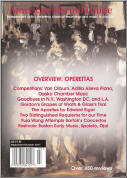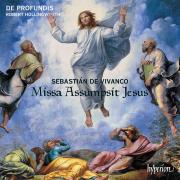Texte paru dans: / Appeared in: |
|
|
Outil de traduction ~ (Très approximatif) |
|
|
Reviewer: William
J. Gatens Sebastian de Vivanco (c1551-1622) and Tomas Luis de Victoria (1548-1611) were both born in Avila and probably sang together as choristers in that city’s cathedral choir. Both were ordained to the priesthood and had distinguished careers as church musicians, but whereas Victoria spent a significant part of his career in Rome, Vivanco remained in Spain where he held several important cathedral positions and a professorship at Salamanca University.
The principal work on this recording is Vivanco’s Mass Assumpsit Jesus. It draws its thematic material from the composer’s motet of that name, performed here in the position of an Offertory motet. The movements of the mass are placed in the liturgical context of the plainsong propers for the Feast of the Transfiguration (August 6). Vivanco’s ‘O Sacrum Convivium’ follows the Agnus Dei of the mass as a communion motet. Neither the liturgical plainsong offertory nor the communion antiphons are sung here. The rest of the program consists of five additional motets and an alternatim Magnificat setting. Two of the motets—’De Profundis’ and ‘Versa Est in Luctum’—are lamentations. The next three are for Marian devotion. ‘Surge, Propera, Amica Mea’ and ‘Veni, Dilecte Mi’ take their texts from the Song of Songs. At that time those biblical love songs were regarded as Marian. ‘Assumpta Est Maria’ is more explicitly so. The concluding Magnificat Primi Toni comes from an important 1607 publication of Vivanco’s works that includes two complete cycles of Magnificat settings in the eight ecclesiastical tones plus two additional settings: one in the first tone (performed here) and one in the eighth.
Where Victoria’s music often suggests an intense passion beneath a highly disciplined surface, Vivanco’s mass setting has a more statuesque formality. He was second to none in his mastery of contrapuntal technique, and he seemed to enjoy writing complex canons. The second Osanna in this Mass contains an exceptionally intricate one that involves diminutions, retrogrades, and mensurations. In his notes to this recording, Bruno Turner describes the effect as “a rich but impenetrable aural experience”. Judging from the works recorded here, Vivanco was more engaging musically as he responded to the expressive content of motet texts. After the relatively low emotional temperature of the Mass setting, ‘O Sacrum Convivium’ projects a devotional warmth of the sort I associate with Victoria. The two lamentations are touchingly eloquent and poignant. I found myself carried away with the sumptuous choral sonorities of ‘Surge, Propera’. Mark Dourish founded the Cambridge-based vocal ensemble De Profundis in 2011. It is an all-male choir whose specialty is continental Renaissance polyphony in the original lower pitch. There are 25 singers listed for this recording. Bass lines are doubled on the bajon, an early form of bassoon. The performances are extraordinarily fine, with a warm and beautifully blended choral tone. | |
|
|
|
|
Cliquez l'un ou l'autre
bouton pour découvrir bien d'autres critiques de CD |
|




